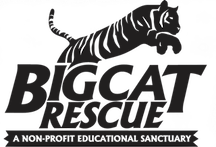Press Release





- For Immediate Release:
- Contact
- Marty Irby
- marty@animalwellnessaction.org
Broad Coalition Calls on House to Pass Legislation to Stem the Trade in Big Cats As Pets and Cub Petting Roadside Attractions
Washington, D.C. — The trade in big cats for the pet trade and for cub petting always turns out badly for the animals, and it often turns out badly for people who cross paths with them, a coalition of lawmakers, law enforcement leaders, and animal welfare groups asserted as the House prepares to take up H.R. 1380, the Big Cat Public Safety Act, later this week.
The legislation seeks to ban the trade in big cats as pets and to halt exploitation of the animals for cub petting at roadside zoos – two forms of commerce that have been creating a stream of big cats who soon get too big and dangerous to handle and then are discarded by the industry and face subsequent peril. Animal Wellness Action, Big Cat Rescue, the Animal Wellness Foundation, the Center for a Humane Economy, and SPCA International are calling on lawmakers of both parties to deliver the votes needed later this week to pass the Big Cat Public Safety Act in the U.S. House.
In many cases, when big cats are discarded by roadside zoos, it is a network of animal sanctuaries that are asked to house the animals for the remainder of their lives, and it is an enormous expense.
“When a roadside zoos dump tigers and lions after they are too big to handle, they become an unfunded liability for the next 20 years for animal welfare groups,” said Wayne Pacelle, president of Animal Wellness Action. “It costs as much as a million dollars to house, feed, and care for a single tiger for the 20-year lifespan of the animal. Why should these groups have to spend that kind of money to clean up someone else’s mess?”
“In addition to the unfair burden on sanctuaries like ours, the State Department has confirmed that the widespread untracked private ownership of tigers in back yards in this country is problematic in their efforts to preserve the tiger in the wild when they work to enlist other nations to join the U.S. in resisting the attempts by some countries to legalize the trade in tiger parts,” said Carole Baskin, Founder and CEO of Big Cat Rescue in Tampa, Fla. “Experts believe that legalizing the trade would rapidly lead to extinction of the tiger in the wild. This bill addresses this by phasing out private ownership by individuals who do not have a USDA exhibitor license.”
Captive big cats are not animals that first responders are trained to handle.
“Firefighters, police officers, and EMTs don’t want to face off against a captive tiger or lion when they respond to an emergency at a private home,” said Jeff Denham, a former four-term Republican House member from the Central Valley of California. “I was the lead author of the Big Cats bill during my time in Congress because I know it’s unsafe to breed these animals for commercial profit — unsafe for the animals and for any people who cross paths with a 350-pound carnivore.”
Reps. Mike Quigley, D-Ill., and Mike Fitzpatrick, R-Penn., are now leading the measure, with active support from Reps. Mike Garcia, R-Calif., and House Natural Resources Committee Chairman Raul Grijalva, R-Ariz. A Senate companion bill, led by Senator Richard Blumenthal, D-Conn., also has bipartisan support. The measure is endorsed by the National Sheriffs’ Association and the Fraternal Order of Police, along with former attorneys general throughout the nation.
“Our state is prone to tornados, and I was constantly worried about a twister tearing up Joe Exotic’s roadside zoo in Wynnewood and setting 100 tigers loose in one of our communities,” said Drew Edmondson, a former four-time attorney general of Oklahoma and co-chair of the Animal Wellness National Law Enforcement Council. “It’s a ticking time bomb to have 5, 15, or 50 tigers in a ramshackle facility and we need to do something about these dangerous set-ups.”
Some years ago, a disturbed animal owner released dozens of large powerful animals into the community in Zanesville, Ohio, and Sheriff Matt Lutz was forced to respond to protect the community.
“The terrible and tragic mass release of dozens of lions, tigers, and other dangerous animals into Zanesville by a private owner is an event our community and our officers will never forget,” said Sheriff Matt Lutz. “The experience posed an extreme risk to our law enforcement personnel, who receive intensive training on handling a wide range of situations, but do not, and should not have to, receive training on facing down large dangerous carnivores. Good policy means preventing this sort of thing from happening again, and I urge every lawmaker to back the commonsense Big Cat Public Safety Act to protect our first responders.”
In 2003, the Congress unanimously enacted the Captive Wildlife Safety Act to ban the trade in big cats as pets, and President George W. Bush signed it into law. The measure had a drafting error, and the Big Cat Public Safety Act seeks to correct that problem and to ban breeding big cats for cub petting.
The Zoological Association of America, which had been the primary opponent of the Big Cat Public Safety Act, withdrew its opposition just months ago. The Association of Zoos and Aquariums (AZA) has long supported the legislation.
Many of the major roadside zoo operators featured in “Tiger King” — including “Joe Exotic” Maldonado-Passage, Tim Stark of Indiana, “Doc” Antle of South Carolina, and Jeff Lowe of Oklahoma — are either in prison
The Center for a Humane Economy (“the Center”) is a non-profit organization that focuses on influencing the conduct of corporations to forge a humane economic order. The first organization of its kind in the animal protection movement, the Center encourages businesses to honor their social responsibilities in a culture where consumers, investors, and other key stakeholders abhor cruelty and the degradation of the environment and embrace innovation as a means of eliminating both.
Animal Wellness Action (Action) is a Washington, D.C.-based 501(c)(4) organization with a mission of helping animals by promoting legal standards forbidding cruelty. We champion causes that alleviate the suffering of companion animals, farm animals, and wildlife. We advocate for policies to stop dogfighting and cockfighting and other forms of malicious cruelty and to confront factory farming and other systemic forms of animal exploitation. To prevent cruelty, we promote enacting good public policies and we work to enforce those policies. To enact good laws, we must elect good lawmakers, and that’s why we remind voters which candidates care about our issues and which ones don’t. We believe helping animals helps us all.
The Animal Wellness Foundation (Foundation) is a Los Angeles-based private charitable organization with a mission of helping animals by making veterinary care available to everyone with a pet, regardless of economic ability. We organize rescue efforts and medical services for dogs and cats in need and help homeless pets find a loving caregiver. We are advocates for getting veterinarians to the front lines of the animal welfare movement; promoting responsible pet ownership; and vaccinating animals against infectious diseases such as distemper. We also support policies that prevent animal cruelty and that alleviate suffering. We believe helping animals helps us all.